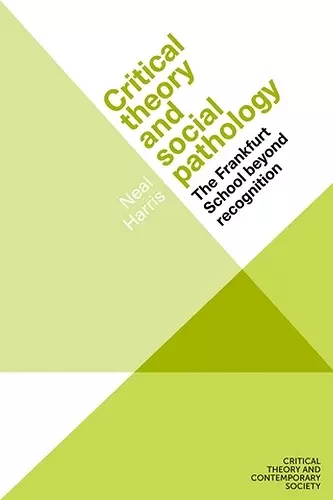Critical Theory and Social Pathology
The Frankfurt School Beyond Recognition
Format:Hardback
Publisher:Manchester University Press
Published:22nd Nov '22
Should be back in stock very soon

In the neoliberal world of the twenty-first century, the progressive academy urgently needs a vehicle for normative social research. Critical theory once answered this call, but today its programme is in crisis. The ‘pathologies of recognition’ approach, popular among contemporary critical theorists, aids neoliberalism rather than challenging it, in part because it is unable to grasp the structural nature of power.
To offer an alternative, this book returns to the work of Erich Fromm and Herbert Marcuse, using it as the basis for a revivified social theoretical foundation. As the first generation of critical theorists knew, thought itself can be reified, our imaginations debased, and our desires artificially induced. We need to think beyond recognition and embrace a more potent and aggressive form of social critique, true to the founding spirit of the Frankfurt School.
'Critical theory and social pathology provides a necessary recapturing of social pathology, unseating it from its position as a ‘second order’ phenomenon to the process of recognition. Harris recognises the important contribution of recent critiques of Critical Theory, but sets them aside, proposing a new way forward. Here, social pathology is regarded as an important platform for a renewed programme of social research. By engaging with this new synthesis of Fromm and Marcuse’s work, Harris allows critical theorists to, once again, step beyond recognition.'
Owen Brown, Marx and Philosophy Review of Books
‘Critical theory and social pathology makes a major contribution to the field. Harris shows how Erich Fromm’s work offers profound and timely insights into the nature of societal pathologies. As such, the book points beyond the recognition approach to social research and offers the foundations for a critical theory of society which reconnects with the founding aspirations of the Frankfurt School.’
Gerard Delanty, Emeritus Professor of Sociology, University Of Sussex
‘This timely and lucid study makes an important contribution to the growing chorus of voices that claim that Frankfurt School Critical theory is in crisis. Its thinkers have abandoned their animating commitment to radical and uncompromising criticism of the pathologies of capitalism and adopted instead a defanged, reformist political stance. In his scholarly and engaging work, Neal Harris identifies the roots of this domestication in the work of Axel Honneth and other theorists of recognition who have substituted the deep critique of power with superficial epistemological concerns. Through a distinctive rereading of the work of Erich Fromm and Herbert Marcuse, Harris demonstrates how the radical thrust of Frankfurt School critique might yet be restored in a revivified diagnosis of the pathologies of neoliberal societies. Thought provoking and essential reading for anyone interested in the state of contemporary critical theory and possible pathways for the renewal of its original emancipatory aims.’
Lois McNay, Professor of Political Theory, University of Oxford
'Critical theory, once the purview of thinkers that were independent, iconoclastic and engaged, has sadly become academic and pedantic, flitting from one intellectual fad to the next. Neal Harris is a welcome exception to this trend. With original and committed intelligence, he reveals the pretensions of academic critical theory and exposes the pedantry that dominates the field. Above the deafening bleats of what now passes for critical theory, Harris's book renews the faith that critique can once again be fused with emancipatory political purpose and the best traditions of modern reason.'
Michael J. Thompson, Professor of Political Theory, William Paterson University
ISBN: 9781526154736
Dimensions: 234mm x 156mm x 13mm
Weight: 463g
200 pages